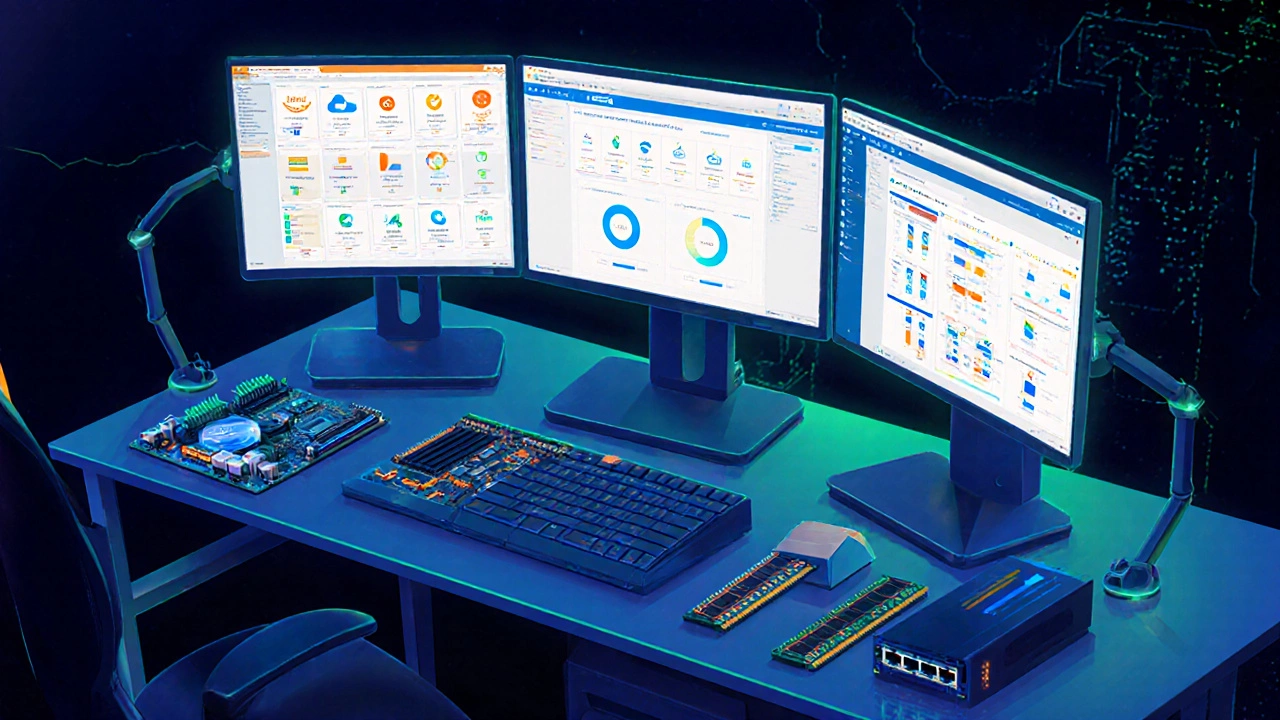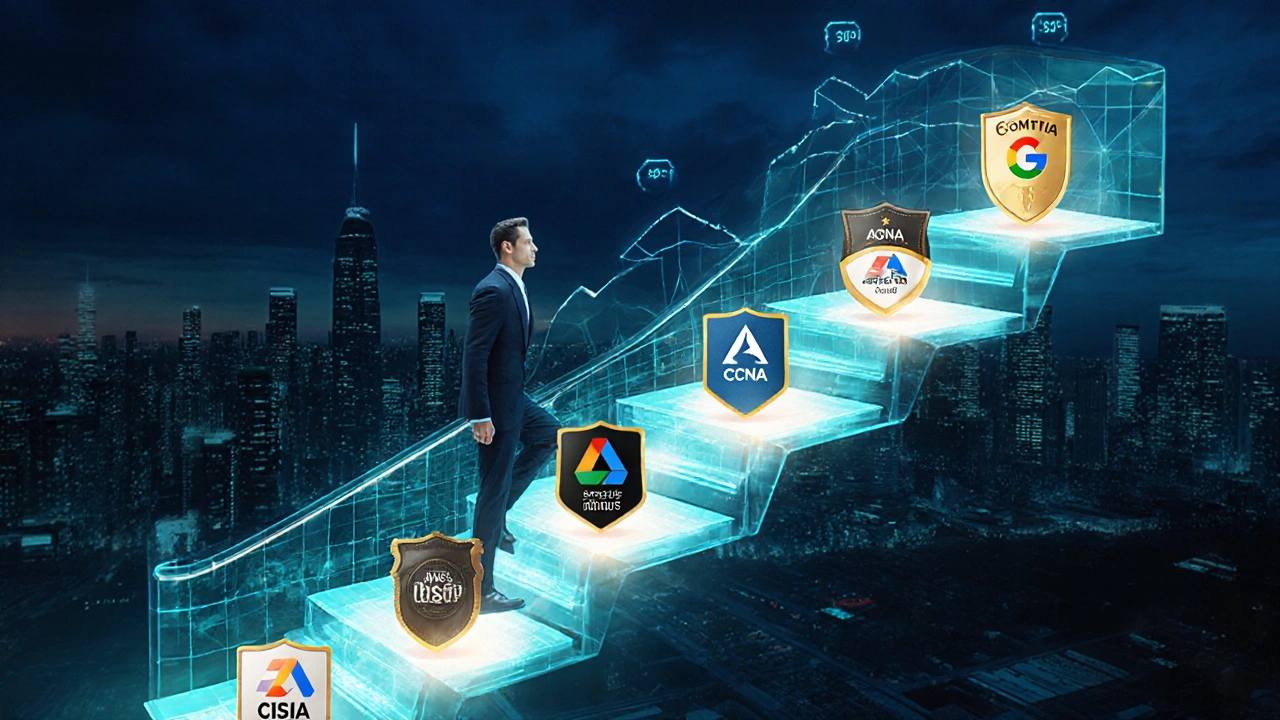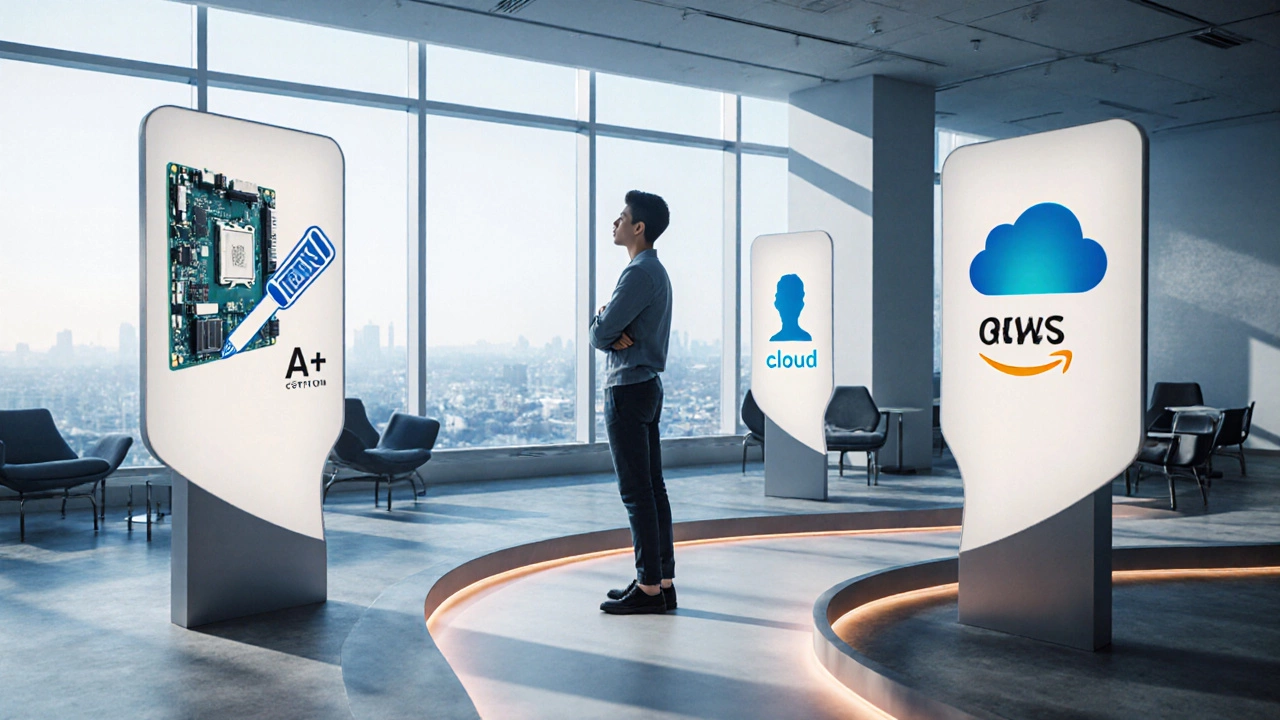IT Certification Salary Impact Calculator
Certification Details
Financial Impact
Important Note: This calculator uses average salary increases from the 2024 Global IT Salary Survey. Actual results may vary based on location, experience, and specific employer.
Quick Summary / Key Takeaways
- Identify what you want to do - networking, cloud, security, or support - and pick a credential that matches.
- CompTIA A+ remains the entry‑level staple for hands‑on troubleshooting.
- Cloud certifications from AWS, Microsoft, and Google dominate demand and salary boosts.
- Cisco CCNA is still the go‑to for networking careers, while CISSP leads for senior security roles.
- Invest in study resources, practice exams, and hands‑on labs to maximize exam success.
When you’re trying to decide IT certification that will actually move your career forward, the market can feel like a maze of acronyms. This guide cuts through the noise, explains why certain credentials matter, and gives you a clear plan to pick the right one for your goals.
Why an IT certification still matters in 2025
Employers aren’t just looking for a degree any more; they want proof that you can do the job today. A well‑chosen IT certification offers three concrete benefits:
- Skill validation: You’ve passed a standardized test that covers real‑world tasks.
- Salary leverage: According to the 2024 Global IT Salary Survey, certified professionals earn on average 12 % more than their non‑certified peers.
- Career mobility: Certifications are portable across companies and often required for promotions.
How to choose the right certification
Don’t chase the flashiest badge; match the credential to your career path. Use this three‑step filter:
- Role focus: Are you aiming for help‑desk support, network engineering, cloud architecture, or security?
- Industry demand: Look at job boards - the top three postings in the last six months list AWS, Azure, and Cisco as must‑have.
- Prerequisite level: Some certs (like CompTIA A+) require no prior experience, while others (CISSP) need five years of work.

Top IT certifications to consider in 2025
Below are the six most sought‑after credentials, each broken down by scope, cost, and average salary bump.
CompTIA A+
Best for: Entry‑level support and hardware technicians.
- Exam format: Two exams (Core 1 & 2), 90 minutes each.
- Cost: $246 per exam (USD).
- Salary impact: +8 % on average for help‑desk roles.
- Study tip: Hands‑on labs with real hardware or virtual sandboxes.
Cisco Certified Network Associate (CCNA)
Best for: Network engineers and anyone managing routers/switches.
- Exam format: One 120‑minute exam (200‑300 questions).
- Cost: $425.
- Salary impact: +15 % for network‑admin positions.
- Study tip: Use Cisco Packet Tracer for simulated routing labs.
Microsoft Certified: Azure Fundamentals
Best for: Beginners entering cloud computing, especially on Microsoft platforms.
- Exam code: AZ‑900.
- Cost: $99.
- Average salary bump: +10 % for cloud support staff.
- Study tip: Leverage the free Azure free tier to practice deploying VMs.
AWS Certified Solutions Architect - Associate
Best for: Designing scalable cloud architectures on Amazon Web Services.
- Exam code: SAA‑C03.
- Cost: $150.
- Salary impact: +18 % on average for solutions‑architect roles.
- Study tip: Build a “free tier” project that includes EC2, RDS, and S3.
Google Cloud Associate Engineer
Best for: Entry‑level cloud engineers on Google Cloud Platform.
- Exam code: ACE.
- Cost: $125.
- Salary impact: +11 % for GCP‑focused roles.
- Study tip: Use Qwiklabs for hands‑on labs that are free for the first 30 days.
Certified Information Systems Security Professional (CISSP)
Best for: Senior security architects and managers.
- Exam format: One 180‑minute exam (250 questions).
- Cost: $749.
- Salary impact: +30 % for security‑lead positions.
- Prerequisite: 5 years of paid security experience.
Side‑by‑side comparison
| Certification | Focus Area | Prerequisites | Exam Cost (USD) | Typical Salary Uplift |
|---|---|---|---|---|
| CompTIA A+ | Hardware & Support | None | $246 per exam (2 exams) | +8 % |
| CCNA | Networking | Basic networking knowledge | $425 | +15 % |
| Azure Fundamentals | Cloud (Microsoft) | None | $99 | +10 % |
| AWS Solutions Architect - Associate | Cloud (AWS) | Basic cloud concepts | $150 | +18 % |
| Google Cloud Associate Engineer | Cloud (Google) | None | $125 | +11 % |
| CISSP | Security Management | 5 years security experience | $749 | +30 % |
How to prepare effectively
Regardless of the credential, a solid prep plan follows the same pattern:
- Official guide first: Download the exam objectives from the certifying body.
- Hands‑on practice: Use labs, sandbox accounts, or home‑lab hardware.
- Community resources: Join Reddit, Discord, or LinkedIn groups where test‑takers share tips.
- Practice exams: Simulate the exact time limit; aim for 80 %+ before the real test.
- Review weak spots: Re‑read the relevant sections and redo labs.

Common pitfalls and how to avoid them
- Skipping the fundamentals: Even seasoned pros need to revisit the basics - a weak foundation leads to failed exams.
- Only reading, no doing: Theory without labs won’t stick; allocate at least 50 % of study time to real equipment or cloud consoles.
- Ignoring exam updates: Certification bodies refresh objectives yearly. Check the latest syllabus before buying books.
- Procrastinating registration: The exam fee is non‑refundable; set a firm test date to keep momentum.
Next steps after you earn the credential
Getting the badge is only half the battle. To translate it into a raise or promotion:
- Update your LinkedIn and resume with the exact certification name and credential ID.
- Ask your manager for a role‑specific project that lets you apply the new skill.
- Consider the next level - most certs have a “Professional” or “Expert” track that can keep your earning curve rising.
Frequently Asked Questions
Which IT certification gives the highest salary boost?
Based on the 2024 Global IT Salary Survey, the Certified Information Systems Security Professional (CISSP) offers the largest average increase, around 30 % over non‑certified peers in senior security roles.
Do I need a degree before getting a certification?
No. Most entry‑level certs such as CompTIA A+ and Azure Fundamentals have no formal education requirement. Employers often value the credential more than a traditional degree for technical roles.
How long are these certifications valid?
Most vendors require renewal every three years, either by retaking the exam or earning continuing education credits. AWS, Azure, and Google Cloud use a “continue‑learning” model with annual credits.
Can I take these exams online?
Yes. All six certifications listed above offer remote‑proctored options, allowing you to sit the exam from a quiet home office.
What’s the cheapest way to start preparing?
Leverage free vendor learning portals (Microsoft Learn, AWS Training, Google Cloud Skills Boost) and open‑source labs on GitHub. Pair these with free practice questions from Reddit threads for a low‑cost prep plan.





Write a comment